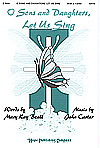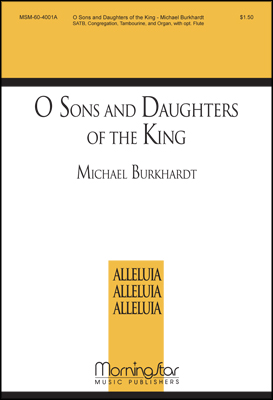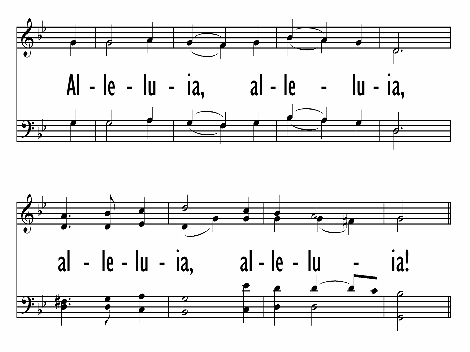- |
User Links
O Sons and Daughters, Let Us Sing!

O sons and daughters, let us sing
Author (attributed to): Jean Tisserand; Translator: J. M. NealeTune: O FILII ET FILIAE
Scripture Songs
Published in 194 hymnals
Printable scores: PDF, MusicXMLPlayable presentation: Lyrics only, lyrics + musicAudio files: MIDI, Recording
Representative Text
Alleluia, alleluia,
alleluia, alleluia!
1 O sons and daughters of the King,
whom heavenly hosts in glory sing,
today the grave has lost its sting.
Alleluia!
2 That Easter morn at break of day,
the faithful women went their way
to seek the tomb where Jesus lay.
Alleluia!
3 An angel clad in white they see,
who sat and spoke unto the three,
"Your Lord has gone to Galilee."
Alleluia!
4 When Thomas first the tidings heard
that some had seen the risen Lord,
he doubted the disciples' word.
Lord, have mercy!
5 At night the apostles met in fear;
among them came their Master dear
and said, "My peace be with you here."
Alleluia!
6 "My pierced side, O Thomas, see,
and look upon my hands, my feet;
not faithless but believing be."
Alleluia!
7 No longer Thomas then denied;
he saw the feet, the hands, the side.
"You are my Lord and God!" he cried.
Alleluia!
8 How blest are they who have not seen
and yet whose faith has constant been,
for they eternal life shall win.
Alleluia!
Final Ending:
Alleluia, alleluia, alleluia, alleluia!
Psalter Hymnal, 1987
Author (attributed to): Jean Tisserand
Died: 1494, Paris, France. A Franciscan monk, Tisserand founded an order for penitent women. He is also said to have written a worship service commemorating Franciscans martyred in Morocco in 1220. Lyrics: O FILII ET FILIAE, Rex coelestis, Rex gloriae O Sons and Daughters, Let Us Sing! Young Men and Maids, Rejoice and Sing www.hymntime.com/tch Go to person page >Translator: J. M. Neale
 John M. Neale's life is a study in contrasts: born into an evangelical home, he had sympathies toward Rome; in perpetual ill health, he was incredibly productive; of scholarly temperament, he devoted much time to improving social conditions in his area; often ignored or despised by his contemporaries, he is lauded today for his contributions to the church and hymnody. Neale's gifts came to expression early–he won the Seatonian prize for religious poetry eleven times while a student at Trinity College, Cambridge, England. He was ordained in the Church of England in 1842, but ill health and his strong support of the Oxford Movement kept him from ordinary parish ministry. So Neale spent the years between 1846 and 1866 as a warden of Sackvi… Go to person page >
John M. Neale's life is a study in contrasts: born into an evangelical home, he had sympathies toward Rome; in perpetual ill health, he was incredibly productive; of scholarly temperament, he devoted much time to improving social conditions in his area; often ignored or despised by his contemporaries, he is lauded today for his contributions to the church and hymnody. Neale's gifts came to expression early–he won the Seatonian prize for religious poetry eleven times while a student at Trinity College, Cambridge, England. He was ordained in the Church of England in 1842, but ill health and his strong support of the Oxford Movement kept him from ordinary parish ministry. So Neale spent the years between 1846 and 1866 as a warden of Sackvi… Go to person page >Text Information
Related Texts
| First Line: | O sons and daughters, let us sing |
| Title: | O Sons and Daughters, Let Us Sing! |
| Latin Title: | O filii et filiae |
| Author (attributed to): | Jean Tisserand |
| Translator: | J. M. Neale |
| Meter: | 8.8.8 with alleluias |
| Source: | Latin Hymn, 13th cent. |
| Language: | English |
| Refrain First Line: | Alleluia! Alleluia! Alleuia! |
| Copyright: | Public Domain |
| Liturgical Use: | Scripture Songs |
- Year A, Easter season, Easter Day
This is recommended for Year A, Easter season, Easter Day by 2 hymnal lectionary indexes including Glory to God: the Presbyterian Hymnal #235. - Year A, Easter season, Easter Evening
This is recommended for Year A, Easter season, Easter Evening by 3 hymnal lectionary indexes including Glory to God: the Presbyterian Hymnal #235 and Lift Up Your Hearts: psalms, hymns, and spiritual songs #190. - Year A, Easter season, Second Sunday
This is recommended for Year A, Easter season, Second Sunday by 5 hymnal lectionary indexes including Glory to God: the Presbyterian Hymnal #235. - Year B, Easter season, Easter Day
This is recommended for Year B, Easter season, Easter Day by 2 hymnal lectionary indexes including Glory to God: the Presbyterian Hymnal #235. - Year B, Easter season, Easter Evening
Year B, Easter Eve by 2 indexes includingGlory to God and Lift Up Your Hearts - Year B, Easter season, Day of Pentecost
This is recommended for Year B, Easter season, Day of Pentecost by 2 hymnal lectionary indexes including Glory to God: the Presbyterian Hymnal #235. - Year C, Easter season, Easter Day
This is recommended for Year C, Easter season, Easter Day by 2 hymnal lectionary indexes including Glory to God: the Presbyterian Hymnal #235. - Year C, Easter season, Easter Evening
This is recommended for Year C, Easter season, Easter Evening by 3 hymnal lectionary indexes including Glory to God: the Presbyterian Hymnal #235 and Lift Up Your Hearts: psalms, hymns, and spiritual songs #190. - Year C, Easter season, Second Sunday
This is recommended for Year C, Easter season, Second Sunday by 6 hymnal lectionary indexes including Glory to God: the Presbyterian Hymnal #235 and Lift Up Your Hearts: psalms, hymns, and spiritual songs #190.
English
- A Treasury of Catholic Song: comprising some two hundred hymns from Catholic soruces old and new #57
- A Treasury of Hymns: The best-loved hymns, carols, anthems, children's hymns, and gospel songs #54
- Ancient and Modern: hymns and songs for refreshing worship #213
- At Worship: a hymnal for young churchmen #158
- Australian Hymn Book #281
- Breaking Bread (Vol. 39) #175
- Carols Old and Carols New: for use at Christmas and other seasons of the Christian year #547
- Carols Old and Carols New: for use at Christmas and other seasons of the Christian year #366
- Catholic Book of Worship #d182
- Catholic Book of Worship III #404 10 shown out of 134
Spanish
Notes
Scripture References:
st. 1 = 1 Cor. 15:55
st. 2 = Matt. 28:1
st. 3 = Matt. 28:2-7
st. 4 = John 20:24-25
st. 5 = John 20:26
st. 6 = John 20:27
st. 7 = John 20:28
st. 8 = John 20:29
This hymn was written in Latin by Franciscan (Minorite) friar Jean Tisserand (b. France, 15th century; d. 1494); it was found in an untitled booklet printed in Paris between 1518 and 1536. Tisserand's text, which began "O filii et filiae, Rex coelestis," was preceded by three "alleluias" and concluded by one. Several additional Latin stanzas were added at a later date. A popular preacher, Tisserand also composed other hymns in French and Latin. In 1492 he founded the Refuge of St. Madeleine, an institution for the rehabilitation of prostitutes.
John M. Neale (PHH 342) translated the text into twelve stanzas, which were published in his Medieval Hymns and Sequences (1851). That translation appeared in an altered form in Hymns Ancient and Modern (1861) and in various other hymnals. Neale's stanzas 1, 3, 5-7, and 8-10 form the present text.
Like 211, this hymn is a narrative Easter carol; it begins with the Easter gospel from Matthew 28:1-10 (st. 1-3) and concludes with the doubting Thomas story from John 20:19-29 (st. 4-8). This hymn and 394 are the two Easter hymns dealing with Thomas.
Liturgical Use:
Because the narrative covers two Easter season Sundays, the stanzas can be divided as follows: for Easter Sunday morning, stanzas 1-3, 5, and 8; for Easter evening, stanzas 1-4 and 8; for the Sunday after Easter (which usually includes the doubting Thomas story), Stanzas 1 and 4-8. Stanza 8 is appropriate at any time as a sung beatitude.
--Psalter Hymnal Handbook, 1988
=========================
O filii et filiae, Rex coelestis, Rex gloriae. [Easter.] Neale in his Medieval Hymns, 1851, classes this with others as belonging to the 13th century; but it is more probably not earlier than the 17th and is apparently of French origin. The Latin text, for the Salut on Easter Day, is in the Office de la Semaine Sainte, Paris, 1674, p. 478. Bäumker, i. p. 569, cites a German translation as in the Nord-Sterns Führers zur Seeligkeit, a German Jesuit collection published in 1671. The hymn is introduced by “Alleluia, Alleluia, Alleluia." It is used in many French dioceses in the Salut, or solemn salutation of the Blessed Sacrament, on the evening of Easter Day. The text will be found in the Paroissiens published for use in the Paris and other dioceses in France. [Rev. James Mearns, M.A.]
Translations in common use:—
1. Ye sons and daughters of the Lord. By E. Caswall, in his Lyra Catholica, 1849, p. 251, and his Hymns & Poems, 1873, p. 152. It is given in some Roman Catholic hymn-hooks in an ab-breviated form.
2. Ye sons and daughters of the King. By J. M. Neale in his Medieval Hymns, 1851, p. Ill, and the Hymnal Noted, 1854, No. 65. In addition to its use in its 1851 form it is also found as:—
(1) 0 sons and daughters, let us sing. This is the Hymns Ancient & Modern text, and is Neale's altered by the Compilers. The Sarum, 1868 is the same text with further alterations.
(2) Children of God, rejoice and sing. For Christ hath risen, &c. This in the Hymnary, 1872, is based upon Dr. Neale and J. D. Chambers,
(3) 0 sons redeemed, this day we sing. In Murray's Hymnal, 1852.
(4) Ye sons and daughters of the Lord. This in Skinner's Daily Service Hymnal, 1864, is a cento from Neale and Caswall.
3. Ye sons and daughters, Christ we sing. By W. J. Blew in his Church Hymn and Tune Book, 1852-55. and in Rice's Selections from the same, 1870.
4. Children of men, rejoice and sing. By J. D. Chambers in his Lauda Syon, 1857, p. 176. It passed into the Salisbury Hymn Book, 1857, and the People's Hymnal, 1867.
Translations not in common use:—
1. Young men and maids, rejoice and sing. In the Evening Office, 1748; the Divine Office, 1763; and 0. Shipley's Annus Sanctus, 1884. In J. R. Beste's Church Hymns, 1849, p. 50, the same translation is given with very slight changes.
2. Let Zion's sons and daughters say. T. C. Porter (1859, revised 1868) in Schaff’s Christ in Song, N.Y., 1869; London, 1870.
3. 0 maids and striplings, hear love's story. C. Kent, in 0. Shipley's Annus Sanctus, 1884.
--John Julian, Dictionary of Hymnology (1907)
For Leaders
Text:
The Latin original text of this hymn is usually attributed to a French Franciscan monk named Jean Tisserand in the fifteenth century, though some scholars think it may have been a French Dominican bishop named Jehan Tisserand in the early sixteenth century. The first known publication of the text was in an untitled booklet in Paris between 1518 and 1536. Other Latin stanzas were also added at a later date. John Mason Neale translated the hymn into English in 1851.
This text appears in nine or ten stanzas in most hymnals. Some divide these stanzas into two separate hymns with the same tune, but most include all the stanzas in one entry. The reason some hymnals divide the text is that the first part of the hymn tells the story of the scene at the tomb on Resurrection Sunday, while the second part tells the story of the disciples' response to the news from John 20:19-29. A refrain of jubilant alleluias opens and closes the hymn.
Tune:
O FILII ET FILIAE takes its name from the first words of the Latin text. It may have originated as a chant tune or as a French folk melody, but there is no scholarly consensus on the issue. Either source of the tune would mean unison singing is more appropriate to the original style than the four-part setting of the earliest publication in 1623 in Paris. Most hymnals have a rhythmic, four-part setting, but a few also include a chant-style unison version. The triple meter of the tune and the joyful theme of the text call for an upbeat tempo. Use full accompaniment on the alleluias.
When/Why/How:
The narrative of the text is appropriate for services where the gospel reading is from an account of the Resurrection or the story of Thomas. For an Eastertide service, try singing with light accompaniment from tambourine and handbells, as in the polyphonic choral setting of “O Sons and Daughters.” Another arrangement of “O Sons and Daughters” is an a capella choral arrangement which alternates between a chant-like unison setting of the tune and a simple four-part harmonization, lending some variety to the long text. Keyboard and flute accompaniment support a combined setting of this gospel narrative and Psalm 118 called “Easter Alleluia,” in which the congregation and choir alternate with the cantor.
Tiffany Shomsky, Hymnary.org
Timeline
Arrangements
Piano/OrganMore Piano/Organ... |  |
ChoralMore Choral... |  |
InstrumentalMore Instrumental... |  |
HandbellsMore Handbells... |  |
PowerPoint
|  |
Media
Psalter Hymnal (Gray) #393
- MIDI file from The Cyber Hymnal #5336
- Audio recording from Evangelical Lutheran Worship #386
- Audio recording from Glory to God: the Presbyterian Hymnal #235
- Audio recording from Glory to God: the Presbyterian Hymnal #255
- Audio recording from Lift Up Your Hearts: psalms, hymns, and spiritual songs #190
- Audio recording from Psalter Hymnal (Gray) #393
- MIDI file from Psalter Hymnal (Gray) #393
- MIDI file from Psalter Hymnal (Gray) #393
- Audio recording from Trinity Hymnal (Rev. ed.) #272
- Audio recording from The Worshiping Church #249
- Audio recording from The United Methodist Hymnal #317
- MIDI file from Worship and Rejoice #313


 My Starred Hymns
My Starred Hymns


